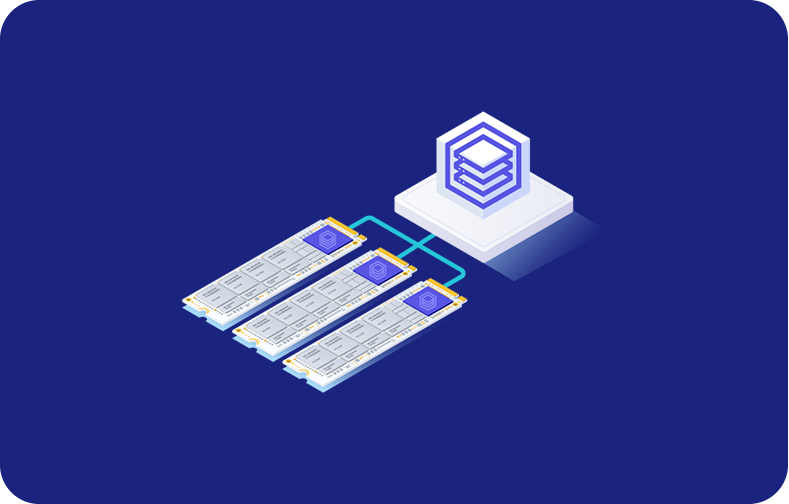VPS vs VPN

The topic of digital connectivity and privacy considerations is a trendy term, such as VPS (virtual private server) and VPN (virtual private network). They both play a crucial role in improving online experiences but are utilized for different reasons. Whereas a Virtual Private Server (VPS) enables users to have exclusive virtual space for hosting their applications and websites with more control and customization over the digital realm, a Virtual Private Network (VPN) is meant to protect and keep anonymous internet protocols. The VPN helps to protect user data and online activities from curious peeps. This comparison between VPS and VPN aims to shed some light on the unique features, use cases, and positive outcomes that each contributes towards the ever-growing realm of connectedness in digital space.
-
- VPS vs VPN comparison
-
VPSServer: The Best VPS Hosting Provider on Your List
-
10 Advantages of Choosing VPS Hosting with VPSServer
- 1. Global Network of Data Centers
- 2. Robust Hardware Infrastructure
- 3. Flexible Operating System Selection
- 4. Managed or Unmanaged Server Choices
- 5. Speedy NvME SSD Storage
- 6. Rapid Environment Deployment
- 7. Cost-effective and Secure Hosting
- 8. Attentive Customer and Technical Support
- 9. Full Autonomy with Root Access
- 10. Wide Range of Payment Methods
-
10 Advantages of Choosing VPS Hosting with VPSServer
- A Comparative Analysis to Clarify Distinctions on VPS vs VPN
VPS vs VPN comparison
| VPS | VPN | |
| What is it? | A leased server | A cybersecurity solution |
| Purpose | Hosting applications, websites, or services. |
Secure, private internet browsing and access. |
| Functionality | Provides a virtualized server environment. |
Encrypts internet traffic for enhanced privacy. |
| Location | Physical server in a data center. |
Virtual network over the internet. |
| Access | Full control and customization of the server. | Anonymized access to the internet. |
| Use Cases | Web hosting, development, testing, etc. | Secure browsing accessing restricted content. |
| Privacy | is Limited to the privacy measures implemented. | Enhances privacy by encrypting data traffic. |
| Security | Depends on server configuration and updates. | Encrypts data to protect against eavesdropping. |
| Network Management | User has control over server configurations. | Managed by VPN service provider. |
| Scability | Can be scaled vertically or horizontally. | Typically, it's not scalable, as it's a Service. |
| Cost | Costs depend on server resources and specs. | Subscription-based pricing for VPN services. |
What is VPS?

A Virtual Private Server (VPS) subdivides a server, creating multiple independent instances for individual use. It's akin to a shared building with multiple rooms, each occupied by a different tenant. The building symbolizes the server, and each room represents a distinct VPS.
These instances are available for rent to host various online elements, such as blogs or applications, making VPS a versatile web hosting solution. A VPS is labeled "private," ensuring exclusive access to server resources like bandwidth and RAM without sharing with other users. In our analogy, it's akin to having a dedicated room in a house with a private bathroom and kitchen facilities.
VPSServer is an excellent VPS and web hosting service provider known for its superior performance and reliability. Offering users a secure and robust platform, VPSServer ensures a seamless hosting experience without compromising speed or flexibility. With a commitment to privacy and exclusive resource allocation, VPSServer emerges as a premier choice for individuals seeking an efficient and tailored web hosting solution through VPS.
How does a VPS work?
A virtual private server, called a VPS, functions as an independent virtual environment hosted on a physical server. A cloud or web hosting provider owns and maintains this physical server. VPS hosting is unique because it relies on virtualization technology, which partitions a single physical machine into multiple private environments. These environments coexist on the same hardware but operate independently, each with dedicated CPU, memory, and storage resources.
VPS provides users with a remarkable level of isolation and autonomy, akin to having a private server, even while sharing the underlying hardware with other instances. This approach ensures efficient resource utilization, scalability, and the flexibility to configure the environment according to specific requirements. Whether for hosting websites, applications, or other digital assets, VPS work balances cost-effectiveness and performance, making it a highly sought-after choice for a wide range of hosting needs.
What is VPS used for?
Virtual Private Servers (VPSs) serve as an integral solution predominantly employed for web hosting purposes. The need for a VPS arises when you require hosting for various applications on a server. In scenarios demanding robust performance and resource allocation, a VPS proves beneficial. For instance, if you operate a resource-intensive application demanding substantial CPU power or your website experiences high traffic and requires additional resources for optimal performance, opting for a virtual private server becomes prudent. Furthermore, hosting eCommerce platforms necessitates seamless operation, and a VPS offers the requisite resources to ensure smooth functionality. Embracing a VPS is also advantageous when running applications or software remotely, offering a versatile solution that caters to the evolving needs of a growing business, providing scalability as your enterprise expands.
When your computing requirements align with these scenarios, a Virtual Private Server emerges as a practical and effective solution, tailored to meet the diverse demands of hosting applications and websites with enhanced performance and scalability.
Why use a VPS from VPSServer?
For businesses experiencing growth or requiring specialized software and applications, VPSServer is the ideal solution. Positioned as a versatile middle ground between shared hosting and dedicated servers, VPSServer provides extensive customization options without the associated high costs. Developers can execute any task on a VPS that they would on a dedicated server, all while being relieved of hardware responsibilities, maintenance, and support concerns.
With VPSServer, content sharing becomes seamless, devoid of unnecessary censorship. Whether it's hosting blogs, social media platforms, or eCommerce sites, the absence of arbitrary limitations ensures a faster and more efficient experience due to dedicated system resources. Many VPS plans are integrated into larger clusters, enhancing redundancy and reliability and minimizing connectivity issues or downtime. This level of high availability guarantees smooth and uninterrupted long-term usage.
Root user access to the entire server, including critical system logs and scripts, empowers users with diagnostic capabilities. Choosing between a "managed" virtual server with pre-installed software or an "unmanaged" server provides unmatched flexibility in shared hosting. Unlike shared hosting, where technical support is often required for log access, VPSServer grants users the autonomy to manage their server environment.
What are the benefits of using VPS?
When contemplating the rental of a private virtual server, several advantages are worth considering. Firstly, opting for a VPS means securing a personal virtual server, eliminating the need to share resources with other website owners, as is familiar with a shared physical server. This exclusivity provides a more reliable and consistent performance for your hosting needs.
A VPS allows more effortless scalability and customization than shared servers. Its inherent flexibility allows you to adjust and configure the server environment according to the needs of your website or apps. Even with the added functionality, managing a VPS is not as complex as dealing with a dedicated server, making it an affordable and user-friendly solution.
The customization feature of a VPS is designed for specific needs, and it implies personal hosting. Cost-effectiveness is also one of the strengths since VPS hosting costs less than dedicated servers but has similar benefits. This makes it an affordable option for businesses or individuals who need a more cost-effective alternative to dedicated servers with higher costs. VPS services are most helpful for people seeking to improve or expand their business activities.
What is a VPN?

The pros of the VPNs include online privacy and liberty with security. The technology also offers secure browsing protection, which is beneficial when using public Wi-Fi connections. In addition, VPNs mask your IP address and protect personal data from all types of risks. With a VPN service subscription, you can surf the Internet without interruption, and no one can watch what you do online.
An ISP is a firm that offers, as the name suggests, connectivity services to homes and organizations. Internet Service Providers provide various internet connection types, namely cable, DSL, fiber-optic, and satellite, that users can connect to the World Wide Web to surf for online content through emails or streaming videos. Moreover, ISPs usually provide products besides technical support, including web hosting services and email accounts. Your Internet Service Provider remains vital to remaining connected with our digital world wherever you may be, whether in your home or office.
Another vital advantage of the use is an opportunity to circumvent government censorship and view restricted web content. VPNs encrypt your Internet connection, meaning no one outside can determine what you do on the web. This encrypts your traffic, preventing Internet Service Providers (ISPs), advertisers, and other interested parties from tracking, recording, or selling it. Through VPNs, you can use your right to information regarding censorship and geographical limitations.
How does a VPN work?
As an online user, starting your VPN software from the service ensures a secure digital journey. The software immediately encrypts your data, safeguarding it before it travels to the server. Then, your data heads to the VPN server and your desired online destination. The information appears to come from the VPN server at the destination, hiding your computer's location.
VPN has excellent benefits such as privacy, flexibility, and security. Secure browsing protection, especially in public Wi-Fi networks, is one of the main advantages. In addition, VPNs hide your IP address and make you anonymous while making you immune to threats that can compromise sensitive data. With a VPN subscription, you are guaranteed seamless browsing, as your online activities remain invisible to hackers.
An ISP is a telecommunication firm that provides internet linkage to the end users. ISPs ensure that users can access the World Wide Web to view online content, send emails, or stream videos through cable DSL, fiber-optic, and satellite internet connections. In addition, most ISPs offer their customers services such as web hosting packages, email addresses, and technical support. Your Internet Service Provider is vital for connecting you to the digital realm in the local or work setting.
Another significant benefit is the bypassing of government censorship and getting access to restricted web content. Your internet connection is encrypted via VPNs, which makes it difficult for outsiders to trace your online activities. This encryption makes it impossible for Internet Service Providers (ISPs), advertisers, and other entities that want to use your Internet traffic in any way, like tracking, recording, or selling the same from using them. VPNs allow you to enjoy freedom of information, which remains hidden from censorship or geo-location restrictions.
Why use a VPN?
As an online user, initiating VPN software from your VPN service marks the commencement of a secure digital journey. The software promptly encrypts your data, adding a layer of protection before it embarks on its journey to the VPN server. Once prepared, your data traverses to the VPN server and proceeds to your desired online destination. At the destination, the information is perceived as originating from the VPN server and its designated location, obscuring the trustworthy source – your computer and its actual location.
For a seamless and user-friendly experience, additional software tailored for Windows, Mac, or Linux compatibility can be installed. The VPN service or your IT coordinator typically provides these software solutions and extends their functionality to smartphones and tablets. Some VPN services offer the convenience of browser-based usage, streamlining the process. Advanced users may explore open-source alternatives like OpenVPN, deployable within a private network, for more intricate and tailored VPN solutions.
Why Should I Not Use a VPN?
Although a VPN is an effective tool for fortifying online privacy and security, it's not free of disadvantages. An important issue is the increased data consumption due to VPN use. This may cause considerable costs to those on limited data plans, slowing the connection speed, especially in shared networks. Additionally, the recurring subscription fee associated with most VPNs can be daunting, mainly when more affordable and efficient alternatives are available. It seems that using VPNs can create new vulnerabilities in the system, which may lead to data security breaches. To conclude, although there are valid use cases for VPNs, they do not always provide the best solution to ensure online privacy and security.
When should I use a VPN?
VPNs are oriented towards personal use, offering protection of privacy on the Internet and several cases where it is beneficial to apply them. To begin with, when accessing public Wi-Fi networks, a VPN becomes necessary to avoid possible security threats. Your encrypted internet traffic is like a shield, keeping unwanted people from accessing your data and ensuring it stays secure.
The other critical use case of VPNs is the desire to browse privately. The VPN offers anonymity, which makes it difficult for entities such as ISPs, government agencies, and other surveillance mechanisms to track your activities online. This additional layer of privacy is a valuable commodity to those who want their online activities secure and confidential.
Beyond personal security, VPNs offer practical solutions for accessing geo-blocked content and avoiding various online nuisances. A VPN virtually grants users access to restricted web content by relocating to another country. Additionally, it benefits individuals aiming to circumvent price discrimination, providing a means to change virtual locations and compare prices for better deals on flights, rentals, and hotel accommodations. Lastly, for those annoyed by targeted ads, a VPN's ability to change IP addresses during each connection adds a layer of difficulty for data tracking, enabling users to evade personalized advertisements effectively.
What are the benefits of using a VPN?
VPN has many benefits, such as online privacy and freedom alongside security. The most important advantage is that it ensures safe browsing protection when connected to public Wi-Fi networks. Besides, a VPN conceals your IP address, boosting anonymity and safeguarding secreted data from threats. If you opt for a VPN service, browsing the web smoothly is fine, and your online activities are hidden from intruders.
Another unique advantage is bypassing government censorship and viewing prohibited web content. Through VPN, your internet connection gets encrypted, which makes it difficult for such external entities to track what you do online regarding browsing. This encryption prevents ISPs, ad brokers, and other entities interested in tracking, recording, and selling your internet traffic from selling or using it against you. VPN allows you to enjoy your freedom of information as your right and lets it be inaccessible neither by location nor censorship under any circumstances.
While free VPN services may seem attractive for their cost-free nature, they usually restrict user's abilities. These limitations can be very diverse but usually include restrictions on data usage, connection speed, and server locations. Some free VPN providers have data caps limiting how much information users can send over their network over a month. Moreover, free VPN servers may be less efficient than paid ones since they can quickly get overcrowded by users. In addition, users may be provided with a limited number of server locations, affecting their ability to go around geo-blocks or access content from specific regions. Although free VPN services can provide vital privacy and security features, users should be aware of these limitations while deciding whether such products meet their requirements before trusting them to protect online activities.
VPSServer: The Best VPS Hosting Provider on Your List

VPSServer, a leading web hosting provider, offers VPS services tailored to diverse needs. Renowned for its commitment to superior performance and reliability, VPSServer stands out as the top VPS solution. With VPSServer, clients access dedicated virtual servers within a shared hosting environment, providing control and resources suitable for medium to high-traffic websites or specialized hosting requirements.
VPSServer's strength lies in offering dedicated server resources within a virtual environment, ensuring optimal performance without resource conflicts. Unlike shared hosting, where resources are shared among multiple users, VPSServer's dedicated virtual servers guarantee a private environment for each user's needs, whether running resource-intensive web applications or maintaining stable hosting services.
Powered by cloud server infrastructure, VPSServer's scalable resources enable users to adjust server capacity swiftly to match changing demands. This flexibility makes VPSServer an ideal choice for businesses with fluctuating traffic or seeking cost-effective hosting solutions without compromising quality. In addition to its robust infrastructure, VPSServer provides comprehensive web hosting services, ensuring users can easily host their websites and applications with confidence.
With unmatched performance, scalability, and reliability, VPSServer is the preferred VPS solution. Offering dedicated server resources, cloud-based infrastructure, and advanced hosting services, VPSServer equips users with the tools needed for seamless hosting experiences. Whether users require cloud or dedicated servers, VPSServer's dedication to excellence is the preferred choice for VPS hosting solutions.
10 Advantages of Choosing VPS Hosting with VPSServer

1. Global Network of Data Centers
VPSServer offers access to over 20 data centers, which are placed in key positions across North America, Europe, Asia, the Middle East, and Australia. This massive network allows users to choose a data center nearest their target audience, thereby increasing the speed and quality of accessibility to online resources.
2. Robust Hardware Infrastructure
VPSServer boasts a high-end hardware infrastructure for its cloud servers. This includes fast RAM, cutting-edge processors like Intel Xeon Skylake 2.7 GHz, and NvME SSDs. Collectively, these components guarantee a reliable and efficient online environment, ensuring seamless performance for hosted websites and applications.
3. Flexible Operating System Selection
VPSServer knows that some users prefer one operating system more than the other. Consequently, the site provides a variety of operating systems, such as Linux and Windows. This flexibility enables users to select the ideal OS, improving server efficacy and suitability.
4. Managed or Unmanaged Server Choices
VPSServer allows users to select from managed and unmanaged server options. This choice allows users to tailor the level of support they receive, ensuring that their hosting experience aligns precisely with their needs and expertise.
5. Speedy NvME SSD Storage
To improve response times and ensure optimal server performance, VPSServer utilizes NvME SSDs in its hosting plans. These high-speed storage drives contribute to faster loading times and enhanced user experiences. Plans with up to 16TB storage capacities are available to accommodate diverse storage needs.
6. Rapid Environment Deployment
VPSServer prioritizes efficiency and convenience by offering fast deployment for VPS hosting. This means that users can immediately access new VPS hosting features shortly after placing orders, minimizing downtime and streamlining their online presence.
7. Cost-effective and Secure Hosting
VPSServer offers optimal performance and reliability at reasonable prices for many users. The platform's hosting solutions offer comprehensive security measures to protect websites and data, thus providing a safe online space.
8. Attentive Customer and Technical Support
VPSServer places a strong emphasis on customer satisfaction. The platform offers responsive technical and customer support teams to assist users with issues. This commitment to customer service enhances the overall hosting experience.
9. Full Autonomy with Root Access
VPSServer grants users complete control over their virtual servers, providing root access for advanced personalization and customization. This level of control is invaluable for users who require specific configurations and optimizations for their hosting environments.
10. Wide Range of Payment Methods
One of the objectives of VPSServer is to meet the needs of users from various countries worldwide, which means that people can pay using their major credit cards, PayPal, and other popular digital currencies. Different ways to pay increase the convenience of users worldwide.
A Comparative Analysis to Clarify Distinctions on VPS vs VPN

In essence, VPS and VPN serve distinct purposes online. VPS is primarily designed for web hosting, efficiently leveraging a single physical server to host multiple virtual servers. This setup caters to hosting needs, including website and shared hosting, while providing cost-effective resource allocation. In contrast, a VPN is centered on bolstering online security and privacy. Establishing a private internet connection through encryption shields IP addresses circumvents censorship, and guarantees a confidential online experience. Though different in focus, these technologies are crucial in optimizing and securing online activities, each catering to specific needs in the digital landscape.
In summary, VPS and VPN serve distinct purposes. VPS is primarily designed for web hosting and efficient resource allocation, enabling website hosting and related services. On the other hand, users focus on establishing a secure and private online connection, safeguarding users' internet activities, ensuring anonymity, and granting access to restricted content. Recognizing these differences is essential when deciding between VPS hosting and VPN services to fulfill specific online requirements.
Frequently Asked Questions
Is a VPN superior to a VPS?
No, VPN and VPS are different technologies with their separate purpose. VPNs increase privacy on the Internet since they make your actions anonymous, and a VPS is just the rent of a server for hosting services. On the other hand, they can be used simultaneously as complementary technologies.
Is VPS trustworthy?
Though the security of a VPS system can still be vulnerable, its isolated structure reduces the likelihood of compromise compared to a shared hosting platform.
Does a VPS come with its unique IP address?
Each VPS is bundled with its dedicated IP server address. Additionally, you can add a Unique IP to each domain (IPv4 or IPv6) for an additional fee.
What is the purpose of using VPS?
A virtual private server, a VPS operates as a virtual machine that offers virtualized server resources within a shared physical server environment. VPS hosting provides exclusive server resources with reserved capacity, granting users enhanced control and customization options compared to shared hosting. This makes it the favored choice for a wide range of hosting requirements.
Can a VPS conceal your location?
A VPS functions as a server and does not inherently hide your location. While some VPS services may offer options to mask activities, installing a VPN on your VPS is necessary to secure your connection and render your VPS untraceable.











